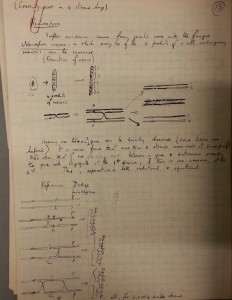Giving lectures is a prominent aspect of working life for many academics, as the animal genetics archives here at Edinburgh University Library Special Collections show. Most of the collections of scientists’ personal papers contain information relating to academic and public lectures given, and frequently also include copies of the lectures themselves, some dating back as far as the 1940s. This material gives a fascinating insight into how genetics teaching has changed and evolved over the decades, but we don’t always hear about the experience of lecturing from the point of view of the listening students. Anecdotes occasionally survive about teachers who were particularly memorable (for both good and bad reasons!). James Cossar Ewart, Professor of Natural History at the University from 1882-1927, was instrumental in establishing genetics as an academic subject at the University of Edinburgh in the early twentieth century, but his reputation as a lecturer is not quite as gilded. One of his students, Maurice Yonge, remembered that Ewart’s lectures were ‘conducted amid scenes of riot and general pandemonium, Ewart…being unable to control the class. Indeed, at times…so chaotic were the proceedings, that only the movement of Ewart’s large walrus moustache indicated he was still lecturing.’ On the other hand, the first director of the Institute of Animal Genetics, F.A.E. Crew, was a charismatic and inspiring teacher, as his friend and colleague Lancelot Hogben recalled:
In the lecture theatre he was a spell binder. Handsome, well built, equipped with a mellifluous voice and a ready but rarely uncharitable wit, he had histrionic talent worthy of a Shakespearean actor and – how rare a combination – an irreproachably lucid gift of exposition.
Valuable as these personal memories are, relatively little evidence of direct interaction between lecturer and listener tends to survive in the archives. However, occasionally, peripheral information, such as items of correspondence, help provide an ‘alternative history’ of genetics teaching – from the student’s perspective. The archives of protozoan geneticist and malariologist Geoffrey Beale contains many of his own handwritten notes in preparation for lectures, many of them given at the University of Edinburgh as part of Genetics or Biology courses. Beale held strong views on the nature and purpose of education, and was certainly did not confirm to the traditional teaching methodologies of the time. However, his approach sometimes caused concern among students used to a more ‘drip feed’ approach. One of the students attending Beale’s lectures in 1969 obviously felt moved enough to provide him with some feedback:
Dear Professor Beale, I hope I may not appear rude in writing to you in this way, but I feel I should offer you some constructive criticism of your course…You did ask us why people were not coming to your lectures, but it would have been difficult to tell you straight out what was wrong…I felt I gained no additional insight or information when I attended your course. You lectures tended to be repetition, and to put it bluntly, often pure waffle. The result was that most of the class became bored and did not attend the rest of the lectures.
The student’s main criticisms were the lack of factual handouts and the time Beale spent during the lecture in encouraging debate and discussion among the students. Beale’s measured and positive response to the letter shows his engagement with the issues raised, stating that ‘it is always valuable to get the reactions of students, especially adverse ones, to ones’ lectures. Otherwise we shall never make any progress.’ Beale goes on to outline the reasoning behind his structuring and delivery of the course, claiming that ‘our aim should be to stimulate students to develop their interests, and to inculcate a critical, thoughtful attitude’ rather than merely to ‘indoctrinate…students with a lot of factual data, to be regurgitated at the appropriate time (during exams) and then forgotten…That is why I spent most of the lecture in what you call ‘waffle.’ He offers to discuss the matter face-to-face with the students, and also asks permission to quote the letter in the University of Edinburgh’s student magazine, as ‘this matter of students’ reactions to unconventional lecture methods needs to be ventilated.’
The student’s reply to this letter reveals an interesting perspective on university-level teaching of science in the 1960s:
A student studying science is inundated from the start [with] important paradigms which he must accept as fact. He is not encouraged to study original papers or pursue the historical approach to science. He is given set ‘problem-answer’ examples to work on and criticism and original slants to the subject are certainly not encouraged…I hope that science students will respond to your ideas and think deeply about them.
Different teaching methods are still a hot topic in the public domain today, and anyone who has ever attended a lecture will know that some listeners will be engaged, and others alienated, by the lecturer’s approach to presenting information.
Geoffrey Beale was clearly willing to openly discuss his teaching methods with his students and to justify his approaches with reference to his own philosophy and beliefs about education. Although it must have come as a disappointment to Beale to hear his lecture described as ‘pure waffle’, he could at least have consoled himself by reflecting on the more unfortunate teaching experiences of James Cossar Ewart.
References:
Lancelot Hogben, ‘Francis Albert Eley Crew 1886-1973, Biographical Memoirs of Fellows of the Royal Society, 20, pp. 135-153 (1974)
B. Morton, ‘Charles Maurice Yonge. 9 December 1899-17 March 1986’, Biographical Memoirs of Fellows of the Royal Society, 38, pp. 378-412 (1992)
Clare Button
Project Archivist

